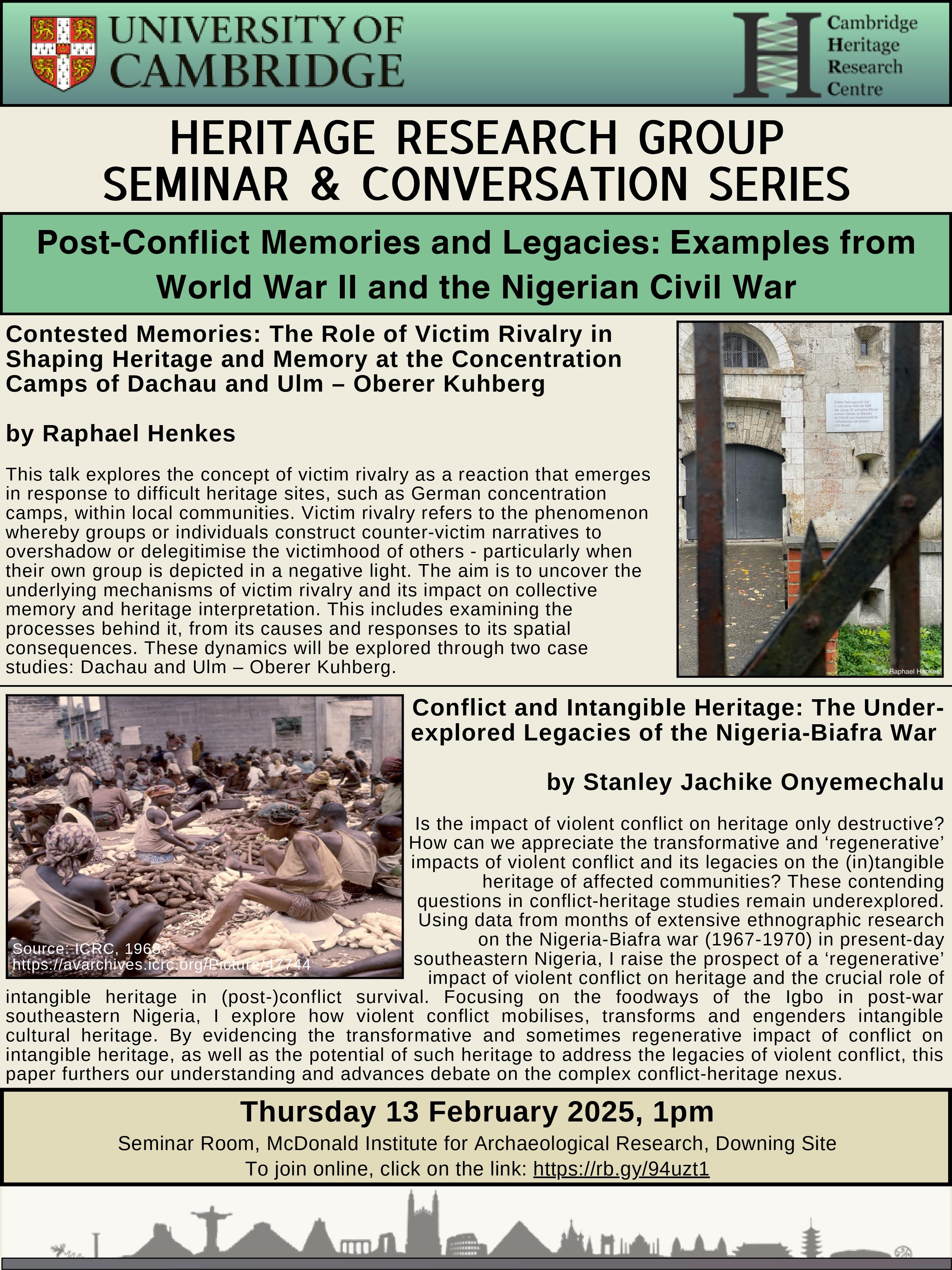
'Post-Conflict Memories and Legacies: Examples from World War II and the Nigerian Civil War'
Raphael Henkes (Cambridge Heritage Research Centre, University of Cambridge)
Stanley Jachike Onyemechalu (Cambridge Heritage Research Centre, University of Cambridge)
Thursday 13th February, 2025
- This is a hybrid event, held at the Seminar Room, McDonald Institute for Archaeological Research, Downing Site and Online
- To join online please use the following link: https://rb.gy/94uzt1.
Contested Memories: The Role of Victim Rivalry in Shaping Heritage and Memory at the Concentration Camps of Dachau and Ulm – Oberer Kuhberg
by Raphael Henkes
This talk explores the concept of victim rivalry as a reaction that emerges in response to difficult heritage sites, such as German concentration camps, within local communities. Victim rivalry refers to the phenomenon whereby groups or individuals construct counter-victim narratives to overshadow or delegitimise the victimhood of others - particularly when their own group is depicted in a negative light. The aim is to uncover the underlying mechanisms of victim rivalry and its impact on collective memory and heritage interpretation. This includes examining the processes behind it, from its causes and responses to its spatial consequences. These dynamics will be explored through two case studies: Dachau and Ulm – Oberer Kuhberg.
Raphael Henkes is an expert in local, national, European, and transnational post-conflict politics of cultural memory. His research interests range from identifying patterns in political and societal responses to past conflicts and disasters to developing concepts for repairing community relations and fostering healing. He completed both his PhD and MPhil in Cultural Heritage Studies at the Cambridge Heritage Research Centre, University of Cambridge. Prior to that, he studied archaeology at the universities of Marburg, Munich, and Bordeaux and participated in various archaeological projects in Iraq, Algeria, Italy, Israel, and Germany.
Conflict and Intangible Heritage: The Underexplored Legacies of the Nigeria-Biafra War
by Stanley Jachike Onyemechalu
Is the impact of violent conflict on heritage only destructive? How can we appreciate the transformative and ‘regenerative’ impacts of violent conflict and its legacies on the (in)tangible heritage of affected communities? These contending questions in conflict-heritage studies remain underexplored. Using data from months of extensive ethnographic research on the Nigeria-Biafra war (1967-1970) in present-day southeastern Nigeria, I raise the prospect of a ‘regenerative’ impact of violent conflict on heritage and the crucial role of intangible heritage in (post-)conflict survival. Focusing on the foodways of the Igbo in post-war southeastern Nigeria, I explore how violent conflict mobilises, transforms and engenders intangible cultural heritage. By evidencing the transformative and sometimes regenerative impact of conflict on intangible heritage, as well as the potential of such heritage to address the legacies of violent conflict, this paper furthers our understanding and advances debate on the complex conflict-heritage nexus.
Stanley Jachike Onyemechalu is a PhD Candidate in Archaeology and Graduate member of the Cambridge Heritage Research Centre, University of Cambridge. His doctoral research explores the intersections of cultural heritage and the legacies of violent conflicts in the context of the Nigeria-Biafra war (1967- 1970). Stanley’s research interests cut across (Post-)Conflict Heritage and Memory, Critical and Decolonial Heritage Studies, Indigenous Knowledge Systems, Museum Studies, and Community Archaeology.
